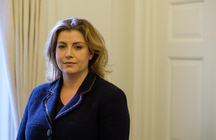Penny Mordaunt – 2018 Statement on Syria and the Brussels Conference
Below is the text of the statement made by Penny Mordaunt, the Secretary of State for International Development, in the House of Commons on 27 April 2018.
The Syrian regime’s continued and systematic blatant disregard for international humanitarian and human rights law has resulted in an unprecedented humanitarian catastrophe. Medical facilities, schools and aid workers appear to have been deliberately targeted, aid has been blocked to starve communities into submission, and rape and sexual violence have been deployed as routine weapons of war.
13.1 million people are now in need of humanitarian assistance, including 5.6 million with acute needs. In addition, over half of Syria’s population has been displaced by the violence, with 5.6 million seeking refuge in neighbouring countries.
Since the conflict began seven years ago, the UK has been at the forefront of the international response. We are the second largest bilateral donor to the crisis. Our support to Syria and the region since 2012 has provided humanitarian assistance to 17 million people, including over 27,000,000 monthly food rations and over 10,000,000 vaccines, and helped over 7.1 million children gain a decent education.
But now, in the eighth year of the conflict, the humanitarian needs of the Syrian people remain as grave as they have ever been. It is clear that the regime has no intention of ending its people’s suffering. The barbaric chemical weapons attack in Douma on innocent civilians, including young children, was yet another example of the regime’s flagrant disregard for its responsibility to protect civilians.
We must not turn our backs on their suffering. That is why at this week’s Brussels conference for Syria and the region, I announced that the UK will provide at least £450 million this year, and £300 million next year to alleviate the extreme suffering in Syria and provide vital support in neighbouring countries. We have now committed £2.71 billion to the Syria crisis since 2012, our largest ever response to a single humanitarian crisis.
Our pledge will help keep medical facilities open so doctors and nurses can save lives, and will help support the millions of Syrian refugees sheltering in neighbouring countries.
Our friends in the region, Jordan, Lebanon and Turkey in particular, continue to demonstrate extraordinary generosity in opening their doors and communities to millions fleeing the conflict in Syria.
We must continue to offer them our fullest support. Not least because as the trajectory of the Syrian war has worsened, our collective interests in a stable and prosperous region have increased. Jordan’s resilience and prosperity are critical to the long-run interests of the region. That is why, in addition to the support to the region provided in our pledge, I announced that the UK will host an international conference with Jordan in London later this year: to showcase Jordan’s economic reform plans, its aspiration to build/enable a thriving private sector, and to mobilise support from international investors and donors.
But money alone is not enough. We continue to support the UN-mediated process as the surest path to peace. But while we work towards a political solution in the future that can end this suffering once and for all, we must not give up on improving conditions in the present. In this spirit, I called upon those present at the conference to join the UK in calling for concrete actions to enable greater protection for civilians and aid workers now. That means an immediate ceasefire and immediate safe access so that brave aid workers and medical staff can do their jobs and help the most vulnerable and the most desperate without fear of attack.
The UK is a global leader within the Syria response. I am proud that at this week’s conference, we demonstrated clearly that we will not turn away from the suffering of the Syrian people—we will continue to lead the response in working with others to call out atrocities, mobilise funding, demand access for aid, protect civilians and ultimately, work towards a solution that can put Syria on a path to peace.

